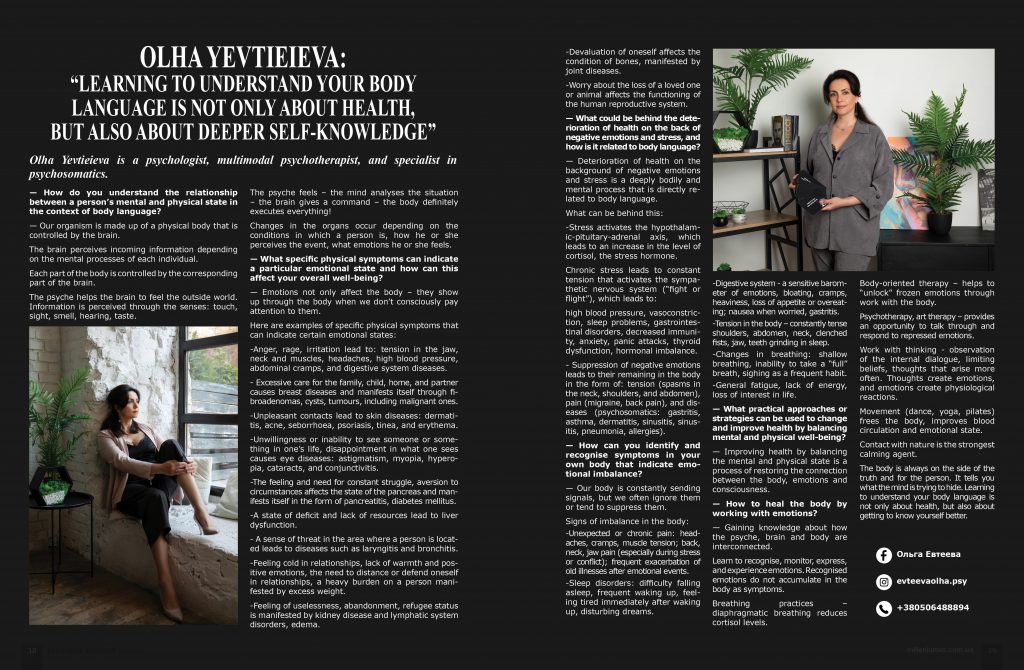Ольга Євтєєва – психолог, психотерапевт в мультимодальному підході, спеціаліст з роботи з психосоматикою.

— Як ви розумієте взаємозв’язок між психічним та фізичним станом людини у контексті мови тіла?
— Наш організм побудований із фізичного тіла, яке керується мозком.
Мозок сприймає інформацію яка надходить в залежності від психічних процесів кожної окремої людини.
Кожною частиною тіла керує відповідна частина мозку.
Відчувати зовнішній світ мозку допомагає психіка. Сприймання інформації відбувається за допомогою органів сприйняття: дотику, зору, нюху, слуху, смаку.
Психіка відчуває – розум аналізує ситуацію – мозок дає команду – тіло все безперечно виконує!
Зміни в органах відбуваються в залежності від умов в яких знаходиться людина, як вона сприймає цій події, які емоції відчуває.
— Які конкретні фізичні симптоми можуть вказувати певний емоційний стан та як це може впливати на загальне самопочуття?
— Емоції не лише впливають на тіло -вони проявляються через нього, коли ми не звертаємо на них увагу свідомо.
Ось приклади конкретних фізичних симптомів, які можуть вказувати на певні емоційні стани:
-Гнів, злість, роздратування призводять до:напруження в щелепі, шиї, м’язах, головного болю, підвищеного тиску, спазмів в животі, захворювань органів травної системи.
-Надмірне піклування про родину, дитину, домівку, партнера стає причиною захворювань молочної залози і проявляється через фіброаденоми, кісти, пухлини в тому числі і злоякісні.
-Неприємні контакти призводять до захворювань шкіри: дерматити, акне, себорея, псоріаз, лішай, ерітема.
-Небажання або неможливість бачити когось або щось в своєму житті, розчарування в тому що бачить людина стає причиною захворювання очей: астигматизм, близорукість, дальнозоркість, катаракта, кон’юктивіт.
-Відчуття і необхідність постійної боротьби, відраза від обставин впливає на стан підшлункової залози і проявляються у вигляді панкреатиту, цукрового діабету.
-Стан дефіциту і нестачі ресурсів призводять до порушення функції печінки.
-Відчуття загрози на території, де знаходиться людина, призводить до таких захворювань як ларингіт, бронхіт.
-Відчуття холоду в відносинах, нестача тепла і позитивних емоцій, необхідність дистанціюватися або захищатися в відносинах, велике навантаження на людину проявляються зайвою вагою.
-Відчуття непотрібності, покинутості, стан біженця проявляется захворюванням нирок і порушення роботи лімфатичної системи, набряками.
-Знецінення себе впливає на стан кісток, проявляється захворюванням суглобів.
-Хвилювання щодо втрати близької людини або тварини впливає на роботу репродуктивної системи людини.
— Що може стояти за погіршенням здоров’я на фоні негативних емоцій та стресу і як це пов’язано з мовою тіла?
— Погіршення здоров’я на фоні негативних емоцій і стресу — це глибоко тілесно-психічний процес, який напряму пов’язаний з мовою тіла.
Що може стояти за цим:
-Стрес активує гіпоталамо-гіпофізарно-надниркову вісь, що приводить до підвищення рівня кортизолу— гормону стресу.
-Хронічний стрес призводить до постійного напруження яке активує симпатичну нервову систему («бий або тікай»), що призводить до:
підвищення тиску, звуження судин, проблем зі сном, збоїв у роботі ШКТ, зниження імунітету, тривожності, панічних атак, порушення функціі щитоподібноі залози, гормональному дисбалансу.
-Стримування негативних емоцій призводить до того, що вони залишаються в тілі у вигляді:напруги (спазми в шиї, плечах, животі), болю (мігрень, біль у спині), хвороб (психосоматика: гастрит, астма, дерматити, синусити, гайморити, запалення легень, алергії).
— Як можна ідентифікувати та розпізнавати симптоми у власному тілі, що вказують на емоційний дисбаланс?
— Наше тіло постійно подає сигнали, але ми часто ігноруємо їх або звикли пригнічувати.
Ознаки Дисбалансу в тілі:
-Несподівані чи хронічні болі: головні болі, спазми, м’язова напруга; біль у спині, шиї, щелепі (особливо при стресі або конфлікті); часте загострення старих хвороб після емоційних подій.
-Порушення сну: важко заснути, часті пробудження, відчуття втоми відразу після пробудження, тривожні сновидіння.
-Травна система – чутливий барометр емоцій, здуття, спазми, важкість, втрата апетиту чи переїдання; нудота при хвилюванні, гастрит.
-Напруження у тілі – постійно напружені плечі, живіт, шия, стиснуті кулаки, щелепа, стискання зубів уві сні.
-Зміни у диханні: поверхневе дихання, неможливо вдихнути «на повну», зітхання як часта звичка.
Загальна втома, відсутність енергії, втрата інтересу до життя.
— Які практичні підходи або стратегії можна використовувати для зміни та покращення здоров’я шляхом збалансування психічного та фізичного стану?
— Покращення здоров’я через збалансування психічного і фізичного стану — це процес відновлення зв’язку між тілом, емоціями та свідомістю.
— Як зцілити тіло через роботу з емоціями?
— Отримання знань про те як пов’язані між собою психіка, мозок і тіло.
Навчитися розпізнавати, відслідковувати, висловлювати, проживати емоції. Визнані емоції не накопичуються в тілі як симптоми.
Дихальні практики – діафрагмальне дихання знижує рівень кортизолу.
Тілесно-орієнтована терапія – допомагає«розблокувати» застиглі емоції через роботу з тілом.
Психотерапія, арт-терапія – дає можливість проговорити й відреагувати витіснені емоції.
Робота з мисленням – спостереження за внутрішнім діалогом, обмежуючими переконанням, думками які частіше виникають. Думки створюють емоції, а емоції – фізіологічну реакцію.
Рух (танець, йога, пілатес) – звільняє тіло, покращує кровообіг і емоційний стан.
Контакт з природою – найсильніший заспокійливий засіб.
Тіло завжди на боці правди і за людину. Воно говорить про те, що свідомість намагається приховати. Навчитися розуміти свою мову тіла – це не лише про здоров’я, а й про глибше пізнання себе.
Olha Yevtieieva: “Learning to understand your body language is not only about health, but also about deeper self-knowledge”
Olha Yevtieieva is a psychologist, multimodal psychotherapist, and specialist in psychosomatics.

— How do you understand the relationship between a person’s mental and physical state in the context of body language?
— Our organism is made up of a physical body that is controlled by the brain.
The brain perceives incoming information depending on the mental processes of each individual.
Each part of the body is controlled by the corresponding part of the brain.
The psyche helps the brain to feel the outside world. Information is perceived through the senses: touch, sight, smell, hearing, taste.
The psyche feels – the mind analyses the situation – the brain gives a command – the body definitely executes everything!
Changes in the organs occur depending on the conditions in which a person is, how he or she perceives the event, what emotions he or she feels.
— What specific physical symptoms can indicate a particular emotional state and how can this affect your overall well-being?
— Emotions not only affect the body – they show up through the body when we don’t consciously pay attention to them.
Here are examples of specific physical symptoms that can indicate certain emotional states:
-Anger, rage, irritation lead to: tension in the jaw, neck and muscles, headaches, high blood pressure, abdominal cramps, and digestive system diseases.
- Excessive care for the family, child, home, and partner causes breast diseases and manifests itself through fibroadenomas, cysts, tumours, including malignant ones.
-Unpleasant contacts lead to skin diseases: dermatitis, acne, seborrhoea, psoriasis, tinea, and erythema.
-Unwillingness or inability to see someone or something in one’s life, disappointment in what one sees causes eye diseases: astigmatism, myopia, hyperopia, cataracts, and conjunctivitis.
-The feeling and need for constant struggle, aversion to circumstances affects the state of the pancreas and manifests itself in the form of pancreatitis, diabetes mellitus.
-A state of deficit and lack of resources lead to liver dysfunction. - A sense of threat in the area where a person is located leads to diseases such as laryngitis and bronchitis.
-Feeling cold in relationships, lack of warmth and positive emotions, the need to distance or defend oneself in relationships, a heavy burden on a person manifested by excess weight.
-Feeling of uselessness, abandonment, refugee status is manifested by kidney disease and lymphatic system disorders, edema.
-Devaluation of oneself affects the condition of bones, manifested by joint diseases.
-Worry about the loss of a loved one or animal affects the functioning of the human reproductive system.
— What could be behind the deterioration of health on the back of negative emotions and stress, and how is it related to body language?
— Deterioration of health on the background of negative emotions and stress is a deeply bodily and mental process that is directly related to body language.
What can be behind this:
-Stress activates the hypothalamic-pituitary-adrenal axis, which leads to an increase in the level of cortisol, the stress hormone.
Chronic stress leads to constant tension that activates the sympathetic nervous system (“fight or flight”), which leads to:
high blood pressure, vasoconstriction, sleep problems, gastrointestinal disorders, decreased immunity, anxiety, panic attacks, thyroid dysfunction, hormonal imbalance. - Suppression of negative emotions leads to their remaining in the body in the form of: tension (spasms in the neck, shoulders, and abdomen), pain (migraine, back pain), and diseases (psychosomatics: gastritis, asthma, dermatitis, sinusitis, sinusitis, pneumonia, allergies).
— How can you identify and recognise symptoms in your own body that indicate emotional imbalance?
— Our body is constantly sending signals, but we often ignore them or tend to suppress them.
Signs of imbalance in the body:
-Unexpected or chronic pain: headaches, cramps, muscle tension; back, neck, jaw pain (especially during stress or conflict); frequent exacerbation of old illnesses after emotional events.
-Sleep disorders: difficulty falling asleep, frequent waking up, feeling tired immediately after waking up, disturbing dreams.
-Digestive system – a sensitive barometer of emotions, bloating, cramps, heaviness, loss of appetite or overeating; nausea when worried, gastritis.
-Tension in the body – constantly tense shoulders, abdomen, neck, clenched fists, jaw, teeth grinding in sleep.
-Changes in breathing: shallow breathing, inability to take a “full” breath, sighing as a frequent habit.
-General fatigue, lack of energy, loss of interest in life.
— What practical approaches or strategies can be used to change and improve health by balancing mental and physical well-being?
— Improving health by balancing the mental and physical state is a process of restoring the connection between the body, emotions and consciousness.
— How to heal the body by working with emotions?
— Gaining knowledge about how the psyche, brain and body are interconnected.
Learn to recognise, monitor, express, and experience emotions. Recognised emotions do not accumulate in the body as symptoms.
Breathing practices – diaphragmatic breathing reduces cortisol levels.
Body-oriented therapy – helps to “unlock” frozen emotions through work with the body.
Psychotherapy, art therapy – provides an opportunity to talk through and respond to repressed emotions.
Work with thinking – observation of the internal dialogue, limiting beliefs, thoughts that arise more often. Thoughts create emotions, and emotions create physiological reactions.
Movement (dance, yoga, pilates) frees the body, improves blood circulation and emotional state.
Contact with nature is the strongest calming agent.
The body is always on the side of the truth and for the person. It tells you what the mind is trying to hide. Learning to understand your body language is not only about health, but also about getting to know yourself better.
